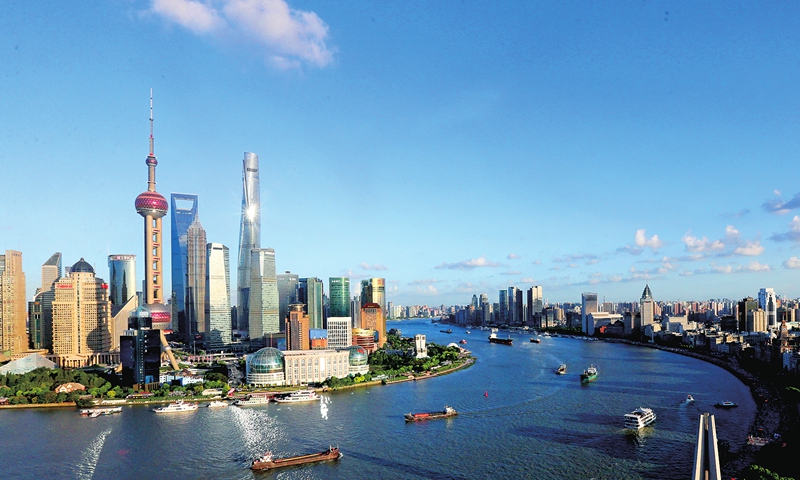
File photo shows a view of the Lujiazui area in Shanghai, east China. (Xinhua)
In the eyes of Pei Yigen, a Shanghai native turned international banker, the present Pudong New Area - a glittering skyscraper hub of China's "magic capital" - was once beyond his wildest dreams.
The opening-up of Pudong, the open secret of its success that mirrors China's economic rise, is unmatched globally, Pei, the former executive vice president of Citibank (China) Co, told the Global Times in an exclusive interview on Thursday.
His earliest memory of the renowned Chinese financial hub dates back to late 1980 when he was a high school student.
Pei lived in Puxi then. Out of curiosity, he took a ferry across the river, only to see a narrow road to a park that was located where the Oriental Pearl Tower now stands. The view failed to pique his interest.
A few years later, Pei revisited the place for a job interview. At that point, there was a cross-river tunnel, in addition to the ferry option. Several buildings had been built, instantly brightening his eyes, as the area's miracle began to take shape along with the Chinese economy's meteoric rise over the past three decades.
The establishment of Pudong New Area was announced in 1990 and the area was officially launched at the beginning of 1993.
Pei graduated from the World Economics Department of Fudan University in 1992, the year that the guaranteed job assignment policy was phased out. He went to a local job market where Citi had set up a recruitment stall. He was one of the five new recruits the US bank hired that year - four were fresh graduates - putting him among the first batch of locals joining global financial institutions.
Citi established a representative office in Shanghai in 1985. It was among six foreign banks that were approved by the Chinese government to open a branch in Shanghai in 1991.
Initially, for foreign firms eyeing a foothold in the Chinese "promised land" that had attracted global capital and talent, there were not many choices in terms of premium office spaces. The very few choices in Lujiazui were filled with financial services practitioners a few years after Pudong was up and running.
Pudong is now home to 1,075 licensed financial institutions, two-thirds of the city's total, Wang Hua, deputy head of Pudong, disclosed in mid-December.
Recollecting his first few years working for the bank, which was originally situated in the then-more developed Puxi before relocating to Pudong, Pei said that workplace canteens or nearby restaurants were a rarity and he had no choice but to take his lunch to the office.
"As a young man, it was really inconvenient to commute with the lunchbox, which would rattle [when] crammed into a crowded bus or subway car."
Judging by what's perceived as a luxurious lifestyle prevailing among financial service professionals nowadays, such austere early days seem unimaginable.
Eating out is preferred for those working in the Lujiazui financial powerhouse now, be it in a canteen with a wide variety of food, a restaurant in a nearby plaza, or an upscale hotel restaurant, according to Pei.
The sea change, said Pei, is attributed to the area's unrivaled level of openness, which has made it a pioneer in implementing new policies and attracting foreign investment, eventually transforming an area of farmland and shanty-town housing into a noted skyline of dazzling skyscrapers.
Pudong is now the wealthiest district in China. Its gross product, according to local official data, tallied 1.27 trillion yuan ($191.86 billion) in 2019, and its per capita GDP was $33,200. By comparison, South Korea's GDP per capita stood at $31,762 in current US dollar terms in 2019, according to the World Bank.
Starting his career from settling international trade, Pei, representing Citibank Shanghai, became one of the earliest dealers in the China Foreign Exchange Trade System, the nation's first interbank currency market set up in Shanghai in April 1994.
He then worked for the Shanghai branch of the Dutch bank ABN AMRO Bank before rejoining Citibank Shanghai in 1998. He was promoted to be the head of the US bank's Shanghai branch in 2007 and subsequently acted as the bank's executive vice president, the position he retired from earlier this year.
Throughout the years, Pei has become known as a made-in-China financier - he has never been out of the country for longer than a month - a local success who bought his first home in Pudong where his story began and where the bravest of the brave reformist drives started.
To jumpstart Pudong's development, a flurry of policies was unveiled to lure foreign investment, Pei said, citing the trial of yuan-denominated businesses initially only allowed in Pudong that attracted many foreign institutions aiming to obtain local currency licenses.
The launch of the China (Shanghai) Pilot Free Trade Zone, located in Pudong New Area, in September 2013 where a raft of reform measures has been introduced is another example of making the area a first mover - for instance, eased cross-border pooling for multinational companies - which was the norm in markets such as London and Singapore but subject to stringent curbs in China.
Saying that everyone would be amazed at Pudong's spectacular rise, Pei envisioned the area to continue its role in spearheading the economy's advance, especially in financial services.
With fintech all the rage, Pudong could do much more to build itself into a fintech hub, he noted.




